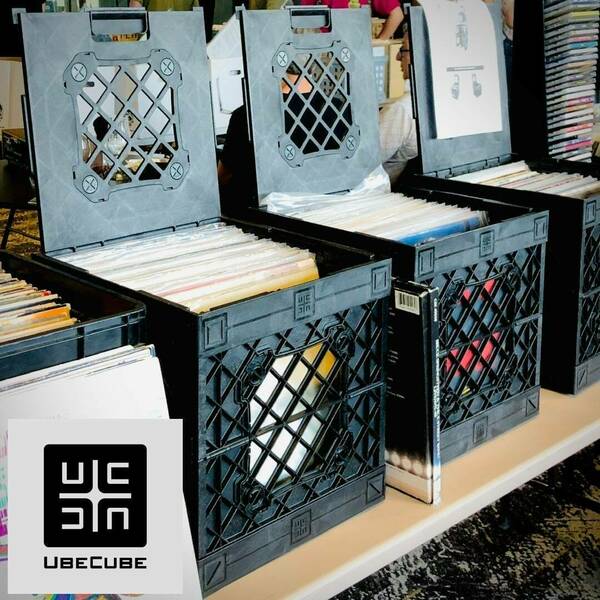
DOMINIC ISMERT
| Company Founded: | UbeCube | Year Graduated: | 1999 |
| Title: | Founder & CEO | Degree: | BBA, Finance & Economics, English |
| Location: | United States | Residence Hall: | Morrissey Manor |
Dominic Ismert estimates he and his family have more than 1,000 plastic crates stacked and scattered throughout their home and across their property in Kansas City, Missouri. They are literally everywhere.
The family uses them to store and organize things in their bedrooms and closets, in the toy room, in the garage, and in the barns and greenhouse. They even use them for their chickens, turkeys and ducks as coops and organizers for feed and supplies.
But why so many? Well, when you have nearly seven kids—a baby boy is due in August—you naturally have tons of stuff to stow. Plastic utility crates come in pretty handy. However, there’s another reason. Ismert is the founder and inventor of UbeCube, the world’s first multi-crate—the Swiss Army Knife of utility crates: stackable, connectable, collapsible, accessorize-able, and uber modular. For the last five years, Ismert, a University of Notre Dame alumnus, has been designing, testing, and perfecting his re-imagined UbeCube super crate and is now poised for a major launch.
And it all started on a napkin.
Or did it?
You see, Ismert grew up in Kansas City, Missouri, the second of ten children. Neither of his parents graduated from college. His father worked in the family’s plumbing manufacturing business. His mother kept the Ismert tribe organized. Both parents instilled in their children that it was up to them to “sink or swim.”
Ismert was definitely a swimmer. When it came time to choose a path to adulthood, Ismert set his sights on attending the best Catholic college that he could: Notre Dame.
“I did well academically in high school, and I got in,” he says simply. He elected Finance, Economics and for good measure, English, as his majors.
During his sophomore year, some unsolicited advice from an alumnus made a big impression. “This older gentleman came up to me on the South Quad and started talking. I don’t remember his name, but his advice stuck with me. He said a degree from Notre Dame would either be the biggest blessing or the biggest curse because of what it does to the psyche of the graduate.”
Not sure where the conversation was going, Ismert continued listening. “He said high achievers with a degree from Notre Dame are under pressure to demonstrate immediate results. Unwilling to take the risk and do what they really want, some graduates take a high paying job to demonstrate success. It gets down to the spirit of the person and their appetite for risk. Money shouldn’t always be the goal.”
Upon graduating from Notre Dame, Ismert accepted a job as an investment banking analyst with a New York investment firm. It would prove to be a career building block, but the advice from the nameless alumnus followed him then as it does today.
He explains his decision. “Early in your career, you take the opportunity that provides the best path to more opportunities. My job as an analyst was very demanding, very exciting for a time and can be very lucrative. The owners of the firm were amazing, and I appreciate them very much even today. But ultimately, I moved back to the Midwest to raise a family.”
Ismert returned to Kansas City, and to the family business, Sioux Chief. Founded by his grandfather in 1957, Sioux Chief manufactures rough plumbing products for residential, commercial, industrial, and government applications. For the next 20 years, Ismert leaned in hard, growing the company alongside his father and others through hard work and innovation. After serving as Chief Marketing Officer and Chief Financial Officer and racking up a stack of patents on his plumbing inventions, he stepped away from the company as a full-time employee to start new ventures. But not before noticing something that would change the course of his career.
“When I was working in the field, I observed that plumbers had dozens of utility crates—in their trucks, their shops, on their job sites. They used them to organize all of their parts on and off the job. I wondered if there was a way to make a better crate. While I didn’t invent UbeCube until later, I thought a better crate would be interesting when I saw how many were used.”
That’s where the napkin came in. “I eventually sketched out what I thought was a pretty good idea for a better utility crate that wouldn’t be too difficult to make.”
Ismert set out to build a better mousetrap, founding UbeCube in 2018. What he didn’t realize was the product he could see so clearly in his mind would take years to bring to market. It seemed so easy! Then again, this was not your ordinary crate.
One source of inspiration was the super popular Yeti cooler that’s as comfortable on a Boston Whaler as it is on an SUV tailgate on Irish game day. “Yeti took something that was a commodity, a cooler, and created a great brand. It wasn’t just coolers. There are Yeti tumblers, backpacks and clothing,” says Ismert. “Yeti has style, quality, and is a great American brand! Where no one else saw an opportunity, they did.”
“That’s what I want to do with UbeCube. Take something already useful and make it amazing.”
The path to amazing proved not to be a walk in the park. Each stage of the commercialization journey required patience and perseverance to work through unexpected issues. Ismert’s first step was working with contract designers to bring his original UbeCube ideas to life. Complicating matters was the collapsible nature of the crates, a seemingly simple but complex design. Once this was worked out, Ismert moved on to 3D-printed prototypes. This, too, required a number of iterations.

Once satisfied, Ismert gave the go ahead to produce their first injection mold to make several thousand crates. “Cutting a mold for injection-molded plastics is very expensive. We do it to see the crate, how the hinges work and how panels attach. We look at both function and production, optimizing for the customer and for manufacturing.”
He adds, “It’s very rare to have a homerun on the first design iteration. We cut two more injection molds before we were satisfied—and we’ll continue to cut more in the future.”
Ismert also considered sustainability. While UbeCubes are the epitome of upcycling because they can be accessorized, stacked and reconfigured in endless ways, they are made from plastic, polypropylene to be exact. He is currently using virgin resign, but recycled resin is a future possibility. “We’re experimenting with recycled material.”
Among the unexpected challenges was the COVID pandemic. Ismert was committed to UbeCubes being American made; however, many domestic injection molding companies were either shut down or not accepting new work. Unwilling to stop progress, he globally sourced the product but immediately started planning to make the products himself.
Ismert began the work to convert a 100,000-square-foot building for manufacturing, warehousing, and offices in Grandview, Missouri. Then COVID threw another curveball.
“I purchased 14 injection molding machines, conveyors systems and robotics. The lead times on equipment were extremely long. We waited 24-plus months,” Ismert says. “We’ve also waited two years for power to be installed due to more equipment and labor backlogs. We are still waiting today, actually, for final pieces but hope it comes together soon.”
While waiting on equipment and power, Ismert shifted attention to marketing. He tested UbeCubes on Amazon as well as selling direct on his website. Beachhead markets were not as expected. Markets such as vinyl records, which were deep on the marketing agenda, organically floated to the top. Other early adopting markets have included garage and shop organization, hobbyists of all sorts and art organization. But Ismert believes with some new products launching soon, UbeCube will make fast inroads into dorm and bedroom, camping and outdoor, fishing and hunting, food and wine, and even toys. With so many use cases for UbeCubes, Ismert focusses on being flexible and responding to customers, while fine tuning current designs and adding accessories. His new plant is set to go live later in 2023, just in time for a major market launch.
“Most startups don’t start with a parallel path of developing a product and a manufacturing plant at the same time. We’ve been riding the current and had to focus intently both on product and manufacturing. These last six months we’ve shifted our attention to packaging, merchandising, building inventory, and hiring sales representation. Now we’re calling on wholesalers, hardware retailers, big box stores, and discount clubs,” Ismert says.
“Our reps are champing at the bit and sales opportunities are coming to us. If we land a couple of major accounts, and do as well as we think we can, we may need a second plant at some point.”
Asked what the biggest challenge has been to date, Ismert is quick to point to the long, time-consuming slog to bring his idea to fruition. “I could see the end result in my head, but it took a huge amount of effort to get things done. Working in a bigger company, you don’t feel the aggravation of delays as acutely as you do in a startup; your bills are being paid by existing business. Startups don’t have that luxury. Building every part of the enterprise takes time and money.”
He adds, “If I could snap my fingers and things happened, I would do it, but I can’t. Ultimately, if there’s enough value in the concept, the juice is worth the squeeze.”
On the flipside, Ismert describes UbeCube as a fun and exciting adventure. His oldest two children, Marianna and Gabriel, currently college upperclassmen, are working with him on marketing. Securing a patent on UbeCube was a satisfying milestone. Receiving a large order was huge as it validated the quality and desirability of UbeCube.
Ismert admits, “In many ways it’s easier to run a billion-dollar business than it is to start a company from the ground up. Every industry is difficult for startups. But it is probably uniquely difficult to start a manufacturing company and a product company at the same time. At the end of the day, the questions are the same: is your product good? Does it add value? Do people want it?”
Ismert advises those who want to start successful companies to focus on their product or service. “The core DNA of what you are doing must be good. If it is, with enough persistence, it will eventually work out.”